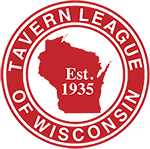The Tavern League of Wisconsin opposes legislation that has been drafted that will allow craft brewers, wineries and distillers to open full-service retail outlets. Under the proposal, these producers would be allowed to open and operate up to three retail outlets per each permit they own, depending on the size of their operations. The full-service retail outlets would be allowed to sell beer, wine and intoxicating spirits, as well as serve food – in essence, these facilities would operate as traditional taverns. The legislation would allow these facilities to operate outside of the existing municipal quota system.
The Tavern League of Wisconsin strongly opposes this legislation. While the craft industry has previously asked for additional retail opportunities, the scope of this proposal is massive, and could potentially lead to hundreds of new alcohol retail outlets throughout the state, outside of the existing municipal quota system, and in direct contrast to the existing three-tier policy of Wisconsin.
Any legislative effort to favor one tier over the other is bad for consumers, bad for small business and bad for our state's economy. It is patently unfair to give one tier a legislative advantage over another tier. For these reasons the TLW is strongly opposed to any legislation which would grant a brewery a liquor license or a winery a liquor or beer license.
Over the last couple of years there has been much talk about how the alcohol industry is regulated and taxed. Since the repeal of prohibition states have used a three-tier system to regulate and tax the industry and it has worked very well by fostering competition within each tier while not giving an advantage to one tier over another. Wisconsin is not unique to the three-tier industry - it is how alcohol is regulated in the United States. Prior to Prohibition there were no laws or regulation between the three tiers – manufacturers, wholesalers and retailers. Many brewers owned taverns and only sold their beer there – so called "tied houses". The system bred widespread corruption, as well as consumer and retail abuses.
With the passage of the 21st amendment repealing Prohibition, however, states were granted the authority to regulate the alcohol beverage industry in their state. To put an end to the pre-Prohibition corruption and ensure proper regulation to protect the public, states implemented a pro-consumer regulatory framework governing the production, distribution and sale of alcohol. This system, generally known as the Three-Tier System, creates a bright line of separation between the manufacturing, distributing, and retail tiers of the industry.
The system today provides necessary checks and balances on each tier, while providing the public the safety net of regulation with the fairness of competition. Under today's three tier system we have experienced a craft beer revolution and local winery expansion which would have never been possible under the old "tied house" laws. Under today's three tier system the state and federal government are able to efficiently collect excise taxes which did not occur prior to prohibition. And under today's three tier system the public is protected by the licensing of all manufacturers, wholesalers and retailers.
